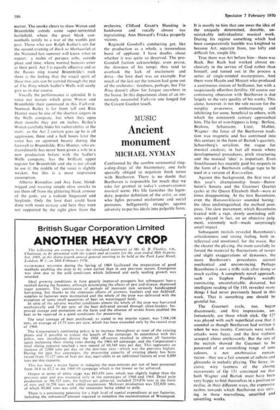MUSIC Ancient monument
MICHAEL NYMAN
Confronted by the sombre ceremonial ring- a-ding-dings of the bicentenary, one feels specially obliged to negotiate fresh terms with Beethoven. There is no doubt that Beethoven is responsible for much that we take for granted in today's conservationist musical scene. His life furnishes the legen- dary, popular definition of the artist, as one who fights personal misfortune and social pressures, belligerently struggles against adversity to put his ideals into palpable form.
It is mostly to him that one owes the idea of the uniquely determined, durable, un- mistakably individualistic musical work. During his regime something which had been comparatively humble was knighted to become Art, separate from, too lofty and difficult for, simple life.
True there was Art before him—there was Bach. But Bach had worked almost ex- clusively in the service of God rather than himself, and turned out in the process a series of single-minded masterpieces. And there were Haydn and Mozart who produced a continuous stream of brilliance, but with a suspiciously effortless fertility. Of course our continuing obsession with Beethoven is due largely to the very quality of his works. This alone, however, is not the sole reason for the weighty awareness, embarrassing and inhibiting for some, beneficial to others, with which the nineteenth century approached him. The list of worshippers is long : Berlioz, Brahms, Schumann, Lizst, Mahler, Wagner—the force of the Beethoven tradi- tion was magnetic and has continued into this century in the form of Bartok's quartets, Schoenberg's serialism, the vogue for musical analysis; in fact all music where developmental procedures, pitch structuring and the musical 'idea' is important. Even Stockhausen has recently paid his respects in the form of a Beethoven collage tape to be used in a version of Kurzwellen.
Against this background, the first two of this year's championship bouts—Baren- boim's Sonata and the Guarneri Quartet cycles at the Queen Elizabeth Hall—were at times disappointing. At the first Barenboim, even the Hammerklavier sounded boring: the ideas undistinguished, the method pom- pous. The slow movement, which Barenboim treated with a rapt, slowly unwinding still- ness—played in fact, on an objective judg- ment, extremely well—made surprisingly small impact.
Subsequent recitals revealed Barenboirn's articulateness and strong feeling, both in- tellectual and emotional, for the music. But the clearer the playing, the more carefully he forced the material by fluctuations of tempo and slight exaggerations of dynamics, the more Beethoven's procedures seemed mechanical and unconvincing. Perhaps Barenboim is now a trifle stale after doing so much cycling. A completely novel approach, such as Stephen Pruslin's weirdly ruminating, uncomfortable, distorted, but intelligent reading of Op 110, revealed many things I had never previously heard in this work. That is something one should be grateful for.
The Guarneri cycle, too, began disastrously, and first impressions, un- fortunately, are those which stick. Op 127 was played with such Superficial ease thai it
sounded as though Beethoven had written it when he was twenty. Contrasts were weak, attacks were fuzzy, and the first violinist scooped about unpleasantly. But the rest of
the recitals showed the Guarneri to be possessed of an astonishing range of tone colours, a not unobtrusive roman- ticism—they use a fair amount of rubato and glissando in melodic playing. The fierce, in- cisive, wiry tautness of the closing movements of Op 131 convinced me that both Wagner and Bartok must have been very happy to find themselves in a position to realise, in their different ways, the expressive realms towards which Beethoven was striv- ing in these marvellous, unsettled and unsettling works.


































 Previous page
Previous page